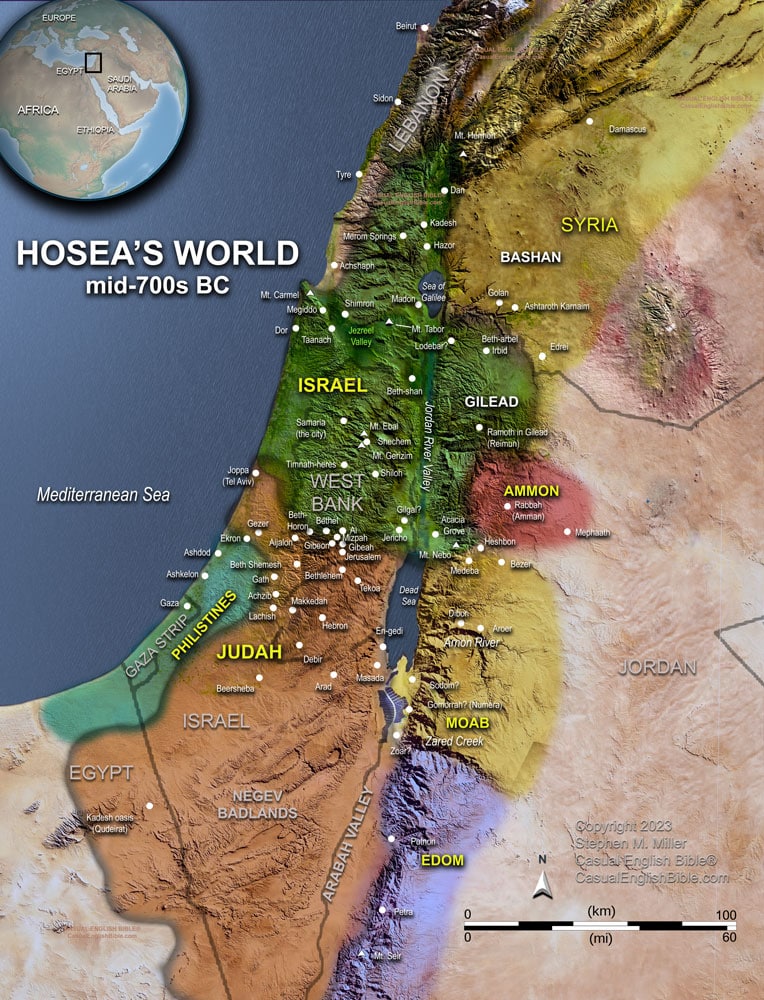Hosea 12
Israel will trade home for a tent
Israel tries to catch the wind
1Ephraim thinks it can herd the breeze. [1]All day, they chase the blistering east [2] wind.
With lies and violence
They make a treaty with Assyria,
Then wave an olive branch at Egypt,
Delivering gifts of olive oil.
2The LORD filed a lawsuit against Judah.
He’s going to punish Jacob [3] fairly,
And make him pay for what he did.
3Even before Jacob was born,
He fought with his brother. [4]
Then when he grew into a man,
He fought with God. [5]
4He wrestled a messenger [6] from heaven
And wouldn’t let him go.
Instead, Jacob wept
And asked the man for help.
Jacob met God in a vision, [7] too,
And talked with him at Bethel.
5It was the God of everyone,
The LORD [8] is his name.
God’s plea to Israel: Come home
6Now, here’s what you should do:Come back to God—your God.
Stick with love and justice,
And always trust your God.
7Ephraim is a Canaanite, [9]
A merchant with rigged scales.
He loves to cheat people.
8Ephraim says, “Look at me.
I’m doggone rich,
I did it my way,
And I didn’t break a law.”
9Well, hear this. I’m the LORD your God.
I brought you here from Egypt.
I’m going to put you back in tents
Like those you used at festivals. [10]
10I spoke to prophets.
I gave them all those visions.
And I taught you plenty in the process.
Gilgal gone
11Gilead [11] is a sinful townThat’s going to disappear.
Gilgal is a pagan town,
Sacrificing to bulls.
I’ll break their altars into a rockpile
Lying beside plowed rows in a field
12Jacob ran off to Aram, [12]
A faraway land in the north.
He bought himself a wife
By working as a shepherd.
13The LORD sent a prophet
To lead Israel out of Egypt.
And the LORD sent his prophets
To guard them through the years.
14Israel bitterly insulted the LORD.
He’ll charge them with their crimes
And make them pay the price.
Footnotes
The wind seems to work as a symbol for Israel’s effort to find allies. They flipped between Assyria and Egypt. If the message of the prophets says anything, it says Israel’s security is in God’s hands. It has nothing to do with peace treaties, wartime alliances, or military might.
The east wind blows into Israel from the deserts of Jordan, Saudi Arabia, and Iraq. It’s a miserably blistering wind in the summer.
Jacob is a real person. But here, he’s a symbol of the Jewish people, including the southern Jewish nation of Judah. In 12:3, however, Jacob refers to the man. Jacob was the father of 12 sons whose families grew into what became the 12 tribes of Israel.
Genesis 25:22-34.
Genesis 32:24.
The messenger may have been an angel. The Hebrew word is mal’āk. It can mean messenger, human ambassador, angel, celestial being.
This was Jacob’s famous dream, in which he saw angels going up and down a staircase to the sky. God stood at the top. Genesis 28:10-22.
“LORD,” usually printed in all capital letters, is a name of God that appears around 7,000 times in many English editions of the Christian Bible. That makes it the most common way of referring to God. The lower-case “Lord” is a translation of the Hebrew word Adonai. It refers to God as our master, our life coach, or the boss. He’s in charge of us, and we try to obey him. “LORD” is the spelling most Bibles use when the writer refers to the name of God. Moses asked God what his name was, and God said Moses should tell the Israelite ancestors of the Jews that his name is “I AM” (Exodus 3:14). In the original Hebrew language, the name is spelled with only consonants—no vowels. It’s an ancient shorthand, to save hides used to make scrolls. The name is YHWH. Without knowing which vowels, most scholars have settled on YAHWEH, pronounced YAH-way. God’s name is so sacred to many Jews that they refuse to speak it. Instead, they’ll use names that describe the character of God, such as Adonai, which means “my Lord.” They won’t even write the name. In English, they’ll spell the name G-d.
It’s a presumption that Hosea is saying Ephraim is as bad as the Canaanites were. The text simply says, literally, “Kᵉnaʽan (Hebrew word) uses dishonest scales.” Canaan can mean the location of what became Israel and Judah. Or it can mean: merchant, trader, traveling salesman. Hosea may have meant only that Ephraim was crooked. Or he may have meant to say Ephraim was as crooked as a nation that God decided to erase from the map. It makes sense because what happened to Canaan also happened to Israel first and Judah later.
Jews commemorated the exodus out of slavery in Egypt by building small huts or setting up tents and living in them for seven days during the Feast of Tabernacles (Leviticus 23:33-44). Jews not only used this time to reflect on where they came from, in times of occupation, by Greeks or Romans, they looked forward to the day they would be freed again.
It’s unclear why Hosea picked on the cities of Gilead and Gilgal. Possibly they had a well-known infamous reputation at the time.
Jacob went to the town of Haran, in what is now Turkey, along Syria’s northwestern border. It was about a 500-mile (800 km) trip. At 20 miles a day, that’s about three to four weeks.
Discussion Questions
- Sorry, there are currently no questions for this chapter.









